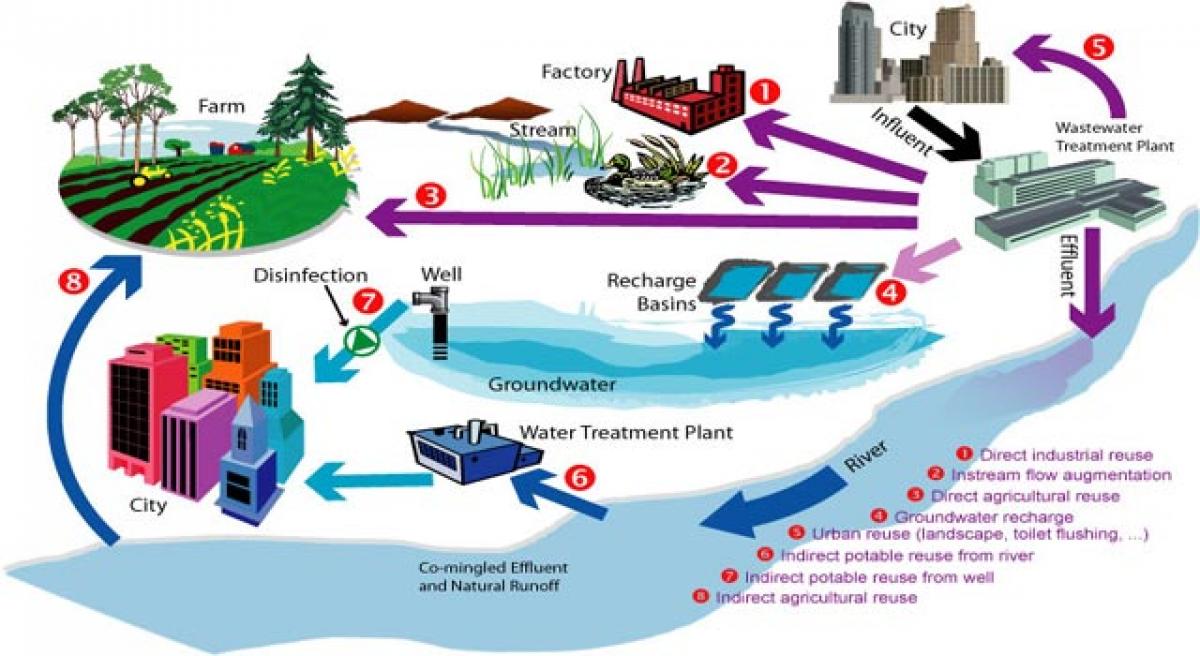Live
- Three persons admitted to hospital for diarrhea treatment
- First Star Outside Milky Way Captured: WOH G64 is 2,000 Times Larger Than the Sun
- Sikkim govt to constitute state Niti Ayog: CM Tamang
- CBI books Rajasthan narcotics inspector for Rs 3 lakh bribe
- Rajasthan bypolls: A tough contest between BJP and Congress
- Albania joins SEPA, paving way for EU integration
- Japanese government approves 250-billion USD economic package to ease price pain
- Six pharma companies to set up their units in Telangana
- The Unstable Events of a 17-Wicket Day in Perth: India vs Australia
- Dutch FM's Israel trip cancelled after Netanyahu's arrest warrant
Just In

Against the backdrop of tensions, that often erupt into violence, among states like Karnataka, Tamil Nadu, Punjab, Haryana and others over sharing water of common-flowing rivers, its usage pattern needs drastic change, say experts.
New Delhi: Against the backdrop of tensions, that often erupt into violence, among states like Karnataka, Tamil Nadu, Punjab, Haryana and others over sharing water of common-flowing rivers, its usage pattern needs drastic change, say experts. India can no longer afford to remain in its existing "use-and-throw-away" mode. Unless the country starts conserving water and re-uses it by recycling, besides addressing issues like contamination of drinking water, these experts believe a major water crisis is just round the corner.
They also recommend new methods of irrigation as over 80 per cent of the available fresh water in the country is used for farming. Himanshu Thakkar, the coordinator of South Asia Network on Dams, Rivers and People (SANDRP), said that groundwater is one of the major sources of fresh water in India -- but it is not unlimited and hence has to be utilised more sensibly. "Groundwater is a major source of water in our country and dependence on this is increasing with each passing day.
We are drawing more water than we are recharging," Thakkar said. "The usage of the groundwater has to be regulated. It's high time that we did so," he added. Noting that recycling was also the need of the hour as the used water cannot be just thrown away, he said: "It has to be used again and again. India cannot afford any more wastage." S K Sarkar, a former secretary of the Ministry of Water Resources, echoed this, saying that India will soon become a water-stressed country and serious measures need to be taken to deal with the situation.
"There is a silent water crisis in the country. It primarily affects the poor. It's already there and we still think that that the water problem is not our problem," he said, adding: "Everybody has to understand this." He said a major portion of India's water is used for irrigation and to minimise this, new methods of farming need to be developed.
"New methods like drip irrigation system, sprinklers and others need to be promoted for efficient use of water," Sarkar said, adding that a lot can be learnt from countries like Israel, which does not have much water and won't let a drop be wasted. Ankur Srivastava, Marketing Program Manager, Agilent Technologies, said access to safe and clean drinking water is of great importance as a significant number of people suffer from water-borne diseases like cholera, diarrhoea and dysentery.
"Water is contaminated with pesticides and VOCs (volatile organic compounds). These are very toxic to the human body and can damage the nervous system and the liver, as well as the kidneys," he said, adding that people need to rely on appropriate scientific solutions to ensure optimum quality of drinking water.
Christophe Beck, Executive Vice President of US-based Nalco Water, said that the overall attitude of people towards water usage needs to be changed as the commodity is limited and cannot be utilised in a "use-and-throw-away manner". "We don't have enough water, it's true for India and the rest of the world as well. By 2030 we will need 40 percent more water," Beck said, adding that the "real solution is to recycle as water is a recyclable commodity".
"The mindset of the people towards water needs to be changed," he said. The latest UN World Water Development Report links water scarcity to the economy and says that three out of four jobs worldwide are water-dependent. "In fact, water shortages and lack of access may limit economic growth in the years to come," the report said.
By Sushil Kumar

© 2024 Hyderabad Media House Limited/The Hans India. All rights reserved. Powered by hocalwire.com







